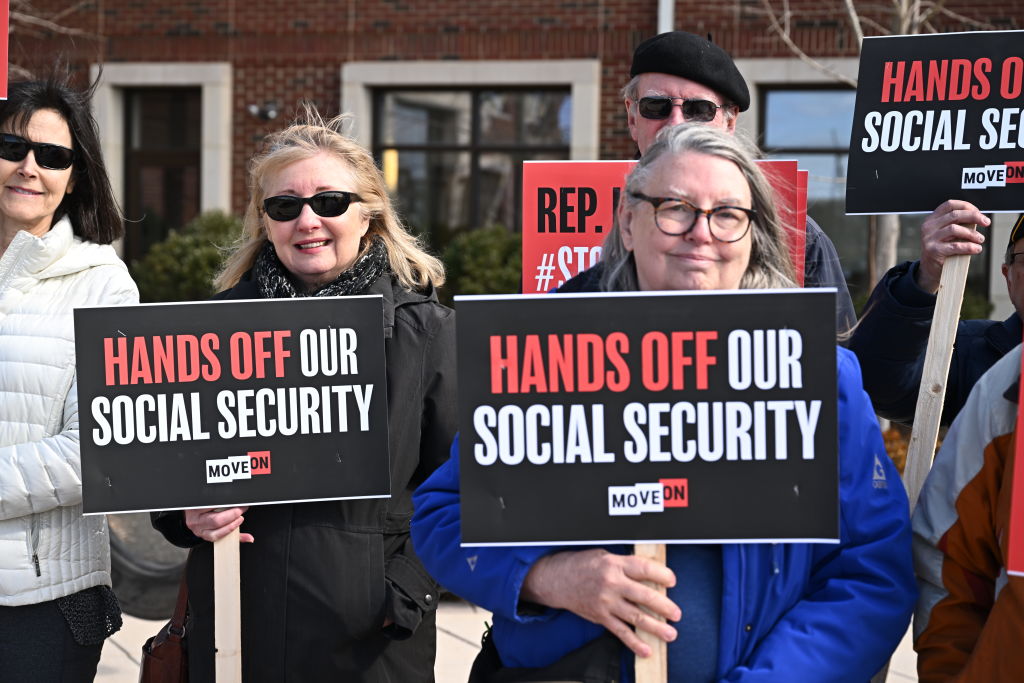Democrats and Republicans agree on very little in this polarized era, but one area of unity is entitlement reform: Both sides agree it’s off the table. While it’s true that entitlement reform polls poorly with voters across the board, polling does not explain why voters hold potential cuts to entitlements in such disdain relative to other government spending cuts, nor why parties are so afraid of even bringing up the topic.
The framing of these programs, particularly Social Security, as “insurance” is arguably part of the issue. In other countries, old-age pension is seen as a charity provided by the government, part of the overarching welfare state that takes care of people who for whatever reason cannot take care of themselves. Retirees are no different from those collecting unemployment or disability benefits, and all of those benefits can be adjusted if needed. In countries with universal health care, budget cuts to health care for seniors (such as Medicare in the U.S.) are no different from cuts to health care for anyone else.
Whatever the reason for the emotional attachment to entitlements, the fact remains that deadlines are looming. The Social Security trust fund is set to run out as early as 2033 and Medicare by 2036. Some Americans are loath to recognize that reality, while others cope by suggesting unrealistic proposals or with cynicism about the future. In short, they are working their way through the famous “five stages of grief” when it comes to dealing with the entitlement crisis.
Denial
Voters in this category will outright deny that entitlement spending is or will become a problem. The Social Security trust fund cannot run out if you ask these voters: They’ve been paying into it their whole lives, how could it be empty? To the extent that these voters admit that the U.S. has budget problems, they will blame it on discretionary rather than mandatory spending.
Such voters often fall back on two false arguments. First, that nothing bad can happen, and second that we don’t have to worry because nothing bad has happened yet. Let’s take them separately.
“Entitlement spending is self-funded.” In a perfect world, this would be the case, but that is not the world we live in. When the trust funds run out, Americans face either massive and automatic cuts to both programs or massive spending increases to cope.
“They’ve been talking about entitlements for decades. Nothing bad ever happens.” It is true that economists have been sounding the alarm about future entitlement spending for more than 30 years. Projections comparing demographic changes and health care spending allowed those who wanted to see to understand years ago that entitlement spending would eventually be a problem. The iceberg was clearly visible in the distance, and the effect of entitlement spending is being felt in permanently higher budget deficits even now, before the trust funds have run out. What cannot keep going eventually stops.
Anger
Voters in this stage recognize that there is a problem, but respond to this problem by lashing out in anger against who or what they feel are responsible, and against those who suggest that they themselves must make changes.
Some typical quotes from the “anger” stage:
“If those politicians touch my Social Security and Medicare they better refund every single penny I have paid into them since I started working.” This goes back to the “‘insurance” fallacy in which people believe that they receive only what they have paid in. In reality, the average American receives $3 in Medicare benefits for every $1 they paid into the program. For Social Security, the balance between payments and receipts is better, yet not 1:1, and these numbers are adjusted for inflation. If the government merely refunded taxpayers exactly the amount they had paid in, as these angry voters demand, the entitlement crisis would ironically be a thing of the past.
“Take your government hands off my Medicare” was a popular slogan heard during Tea Party rallies in the early 2010s which, in retrospect, should have been a hint that the movement was not serious about reducing the deficit. Medicare, just like Medicaid and Social Security, are government programs administered by government agencies. Yet, because people believe they receive only what they have paid in, many Americans don’t think of Medicare and other entitlements as government spending or government money.
Bargaining
Those who have arrived at this stage recognize that there is a problem, and they offer up various “quick and easy” solutions. America does need to have a national conversation about how to solve entitlements, and those in the “bargaining” stage are, in a way, part of that conversation. The truth, unfortunately, is that solving this problem won’t be easy or painless.
For example:
“We just need to eliminate the cap on Social Security contributions.” This is an actual policy proposal championed by many on the left: Just tax the rich! Under this proposal, high-income earners would pay FICA on their entire income, while benefits would remain capped (if the benefits cap is eliminated too, there would be no financial gain for the program). There are many problems with this idea: First, it would not cover the shortfall, and second,it would arguably be a poor prioritization: There is a limit to how much you can tax the rich, and while there is room to tax them more than the U.S. is currently doing, using up most of that space to save Social Security for a few more years would be a less-than-optimal prioritization and, from a redistributive point of view, absolute madness since the median net worth of people aged 65-74 is over $400,000. Even retirees older than 75, who have entered the age when costs for social care begin to mount, have a median net worth in excess of $330,000.
Please note that these are median, not average (mean) values, and thus are not affected by a few super-wealthy retirees pulling up the mean. What these numbers mean is that half of all recent retirees have a net worth (assets minus debts) above $400,000. To raise taxes to the ceiling, and forfeit any other spending priorities which that tax revenue could have been used on, just so that this group not have to shoulder any of the burden as America faces down its unsustainable spending would be a strange way of prioritizing.
“Let’s just stop sending money to other countries.” The average American believes that foreign aid makes up 25 percent of the federal budget, and so it should not come as a surprise that many believe that the entitlement crisis, and the deficit in general, could be sorted if the U.S. would only stop giving away taxpayers’ hard-earned money to foreign countries. In reality, foreign aid is about 1 percent of the budget, and even military support for Ukraine is not much in terms of the budget. Much of that money also comes back to the U.S. in the form of additional demand for American defense industries.
“We need to protect current retirees and those close to retirement age, so let’s just make cuts to future payouts of those who are young now.” The saddest part about this argument is that there was a point when it was true. Had policy-makers made changes years ago, these changes would not have needed to be so drastic. As things stand, if changes are not made, Social Security payouts will automatically be cut by 23 percent when the trust fund runs out. If George W. Bush’s proposal to partially privatize Social Security had passed in 2005, American retirees would have enjoyed the fruits of more than 18 years of stock market growth. Alas, this was not to be. The closer you are to the iceberg, the harder you have to steer to avoid it. Today, there is no longer any way to spare all retirees or those close to retirement age without dramatically raising taxes on everyone, not just the wealthy.
Depression
Among many millennials and members of Gen Z, it has become almost a running joke that they will never get to retire. Americans, who normally are an innovative bunch, are by and large incapable of imagining any type of retirement and elderly care other than their current system.
Voters in this stage can be heard saying things like “I’ll just have to work until I die”. Of course, that is a little too pessimistic. Americans might have to get used to the idea of retiring later than they would like, and should prepare to shoulder a greater burden for their own retirement and other costs related to aging, but that doesn’t mean retirement will be out of reach for most people. Cynicism may be understandable, but it’s not not constructive.
Finally, Acceptance
At this stage, voters understand that drastic changes are needed to ensure entitlement programs can survive at all, but they embrace the challenge not with despair (as in the previous stage) but with a creative mindset and determination that it can be done.
In the acceptance stage, voters say things like, “We can’t pretend like the entitlement crisis isn’t happening, so let’s sit down and all agree to sacrifice,” and, “Other countries have privatized entitlements and they are actually doing just fine, so there is no reason we can’t.” The last point is the most important: The United States is not the only country dealing with an aging population that is putting a strain on government finances. Bush’s 2005 privatization proposal is a good starting point, and it was itself based on a reform carried out by Sweden a decade earlier, a reform that has now led to social security payments being higher than they were under the old system. How? Because while the government pays less, Swedish retirees have benefited from stock market gains that American retirees missed out on.
Given that seniors are, as mentioned earlier, actually the wealthiest age group, a lot of money could also be saved by means-testing entitlements. Of course, some seniors may respond to means-testing by gifting their children and grandchildren their inheritance while they are still alive so that they hold less assets than the means-testing threshold. I doubt this would be common, but if so, it would actually be amazing for the economy by helping young adults buy property, when otherwise they may have had to wait another 10 to 20 years for their parents or grandparents to die.
The five stages of grief model has been criticized by behavioral scientists for being too linear. Realistically, grieving people do not pass in an orderly manner from one stage to the next, but rather may jump from denial to anger, back to denial and so on until finally settling into acceptance (though some sadly never reach this stage). This is to be expected with entitlement reform as well. A change in public mood will not come easily, especially given that most Americans wish to spend more, not less, on entitlements. Yet, if America is to avoid a fiscal mess incompatible with its continued status as an economic superpower, policymakers will soon have to drag voters through national grief therapy.








Please note that we at The Dispatch hold ourselves, our work, and our commenters to a higher standard than other places on the internet. We welcome comments that foster genuine debate or discussion—including comments critical of us or our work—but responses that include ad hominem attacks on fellow Dispatch members or are intended to stoke fear and anger may be moderated.
You are currently using a limited time guest pass and do not have access to commenting. Consider subscribing to join the conversation.
With your membership, you only have the ability to comment on The Morning Dispatch articles. Consider upgrading to join the conversation everywhere.